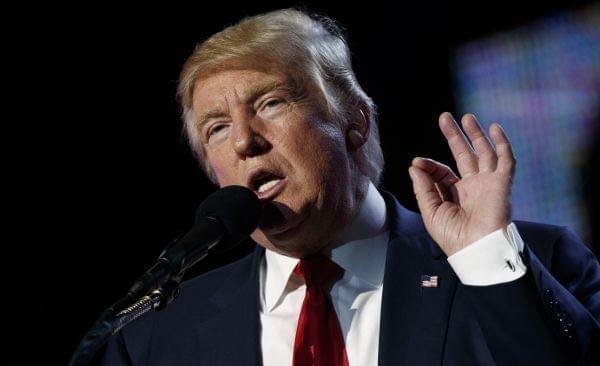Suburban Chicago Republican Candidates Avoid Talking About Trump

Republican presidential candidate Donald Trump speaks to the Republican Hindu Coalition, Saturday, Oct. 15, 2016, in Edison, N.J. Evan Vucci / AP
In the Glenbard South High School library, candidates running for state representative took questions for about half an hour on Sunday. They answered questions in front of about 60 of the most civically engaged voters, who had sat through more than three hours of watching local political debates in the DuPage County town of Glen Ellyn, west of Chicago. There was one theme that was consistent throughout the afternoon: Republican candidates don’t want to talk about Donald Trump.
Most questions facing candidates for Illinois state representative and state senator focused on questions about dysfunction in Springfield. But smack in the middle of the forum was the question: Who are you supporting for president?
Democrats all said they supported Hillary Clinton. Republicans had a little more difficulty answering.
Incumbent State Rep. Peter Breen, R-Lombard, didn’t seem eager to talk about Trump.
“I have not gotten involved in this presidential election,” Breen told the crowd. “I’ve really stuck to more of my local races. I usually only endorse when I can make a difference in the race and when I know the folks.”
The question also came up in the state senate race in DuPage County, in which Republican Seth Lewis is challenging incumbent State Sen. Tom Cullerton, D-Villa Park. Lewis had a similar answer to Breen.
“I believe our state problems are far different than our national problems, so I’m just going to refrain and say I’m focused on Illinois and becoming our next elected state senator here in Illinois,” Lewis said.
DuPage has a long history of supporting Republicans, although that’s been changing a little in recent years. For as tepid as the candidates were talking about Trump, those in the crowd were not.
“I’ve been a Republican all my life,” said Harold Chaney. “My dad was a county chairman in the Republican Party, but this Republican we got running right now is not my favorite.”
Republicans running for local office are between a political rock and a hard place when confronted with the question about Trump. Either disavow the party’s candidate, and upset the voters who put him there, or support Trump and risk losing your own election since Trump is polling well behind Clinton in Illinois.
Given his long ties to the Republican Party, Chaney said it’s not easy for him to go against the Republican presidential candidate, but he’s voting for Clinton. He called Trump an actor, not a politician, who was born with “a golden spoon in his mouth.”
When asked if he would think differently about a candidate for state representative or state senator based on whether he or she supported Trump, Chaney said he would.
“If they have his philosophy, I’d vote against them,” Chaney said.
This underscores why Illinois Republicans are not talking about Trump--because they could still win Chaney’s vote on the local races.
Gov. Bruce Rauner has avoided the presidential race as much as possible. He did criticize Trump last week for saying in a 2005 tape he can get away with kissing and groping women.
U.S. Rep. Peter Roskam, R-Wheaton, has supported Trump. He didn’t attend Sunday’s forum, but he has criticized Trump in the last week and said Trump still has to earn his vote. Roskam also said Clinton has already disqualified herself.
Roskam’s moment of reluctance for Trump is similar to what Wheaton resident Michael Barbier is going through as another Republican who said he is begrudgingly voting for Trump. Barbier said Trump is the lesser of two evils.
“One guy says a lot of terrible things. One woman does a lot of terrible things. I guess I’ll go for the guy that hasn’t done terrible things,” Barbier said.
On that note, he said how a down ballot candidate talks about Trump could also affect his decision of whether to support that candidate or not.
“You’re looking not only where they stand on the policies but the character of the individuals,” Barbier said. “I think (the presidential race) brought it into focus. We used to take that for granted in the past but now I don’t think we do.”
For Barbier, the thing he’s learned from this presidential race is that you can’t take it for granted that candidates for public office are good people.
Tony Arnold covers Illinois state politics for public radio station WBEZ in Chicago. Follow him @tonyjarnold.
